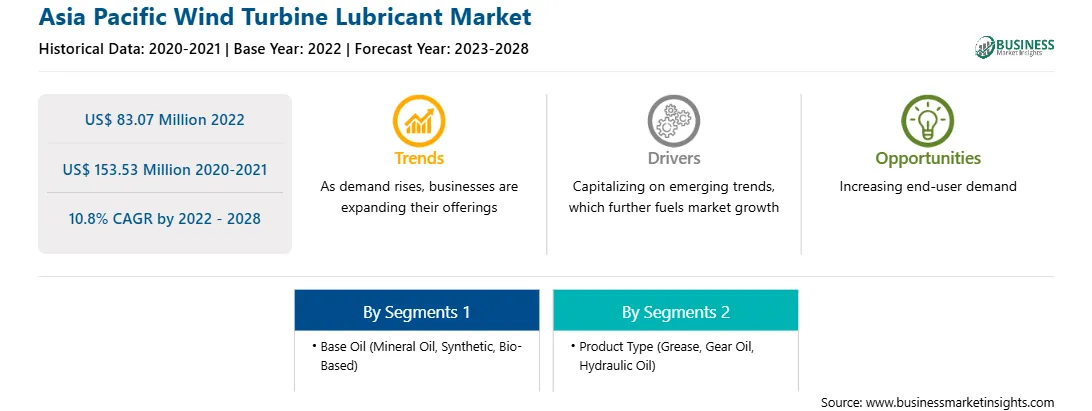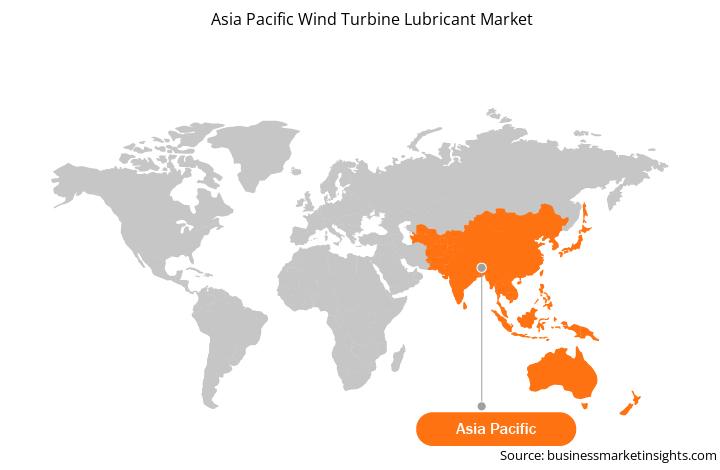In recent years, there has been an increasing interest among manufacturers to produce lubricants from bio-based sources. The use of biodegradable lubricants helps to avoid disastrous consequences in the case of accidental spillages. Oil leaks from wind turbines pollute the soil and water. In wind turbines, many lubricants such as oils and greases are based on mineral oils that cause pollution if they leak. If these lubricants are leaked into the sea, the clean-up process is challenging. However, oil leaks can be avoided by using bio-based lubricants, as they cause no pollution and degrade naturally if they leak. Lubricants are required in various applications in a wind turbine, such as in bearings, couplings, and gears, as well as in hydraulic systems. In these components and systems, the use of effective alternatives with low environmental impact, such as bio-based lubricants with a wide temperature range, ensures reliable operation. The use of bio-based lubrication products for wind turbines is beneficial in the analysis of environmental consequences. As a result, manufacturers are focusing on developing reliable products with an extended service interval and a low ecological footprint. Hence, the development of bio-based lubricants is expected to fuel the wind turbine lubricants market growth during the forecast period.
The wind turbine lubricants market in Asia Pacific is segmented into Australia, China, India, Japan, South Korea, and the Rest of Asia Pacific. China is a major contributor to the market growth in this region. The country has been the world's largest and fastest-growing producer of renewable energy for more than a decade. Moreover, it has the world’s largest wind energy market. China remained the world’s largest market for new onshore additions in 2020, driven by the feed-in tariff (FiT) cut-off. India also records the remarkable growth of the wind power industry due to policies and regulations adopted by the union and state governments. In Japan, the government has set the target of 10 GW of offshore wind installation by 2030 and 30–45 GW by 2040. According to the IEA Wind TCP, Japan’s wind power capacity reached 4,581 MW by the end of 2021. The Japan Wind Power Association stated that the country installed 232.9 MW of new wind capacity in 2022, bringing the total capacity in operation to 4,802 MW. Thus, the increasing installed wind capacity in China, Japan, India, and Australia, among others, drives the demand for wind turbine lubricants. Countries such as Taiwan, South Korea, Vietnam, and the Philippines are also taking various initiatives to further their installed wind capacities, adding to the region's demand for wind turbine lubricants.
Strategic insights for the Asia Pacific Wind Turbine Lubricant provides data-driven analysis of the industry landscape, including current trends, key players, and regional nuances. These insights offer actionable recommendations, enabling readers to differentiate themselves from competitors by identifying untapped segments or developing unique value propositions. Leveraging data analytics, these insights help industry players anticipate the market shifts, whether investors, manufacturers, or other stakeholders. A future-oriented perspective is essential, helping stakeholders anticipate market shifts and position themselves for long-term success in this dynamic region. Ultimately, effective strategic insights empower readers to make informed decisions that drive profitability and achieve their business objectives within the market. The geographic scope of the Asia Pacific Wind Turbine Lubricant refers to the specific areas in which a business operates and competes. Understanding local distinctions, such as diverse consumer preferences (e.g., demand for specific plug types or battery backup durations), varying economic conditions, and regulatory environments, is crucial for tailoring strategies to specific markets. Businesses can expand their reach by identifying underserved areas or adapting their offerings to meet local demands. A clear market focus allows for more effective resource allocation, targeted marketing campaigns, and better positioning against local competitors, ultimately driving growth in those targeted areas.Asia Pacific Wind Turbine Lubricant Strategic Insights

Asia Pacific Wind Turbine Lubricant Report Scope
Report Attribute
Details
Market size in 2022
US$ 83.07 Million
Market Size by 2028
US$ 153.53 Million
Global CAGR (2022 - 2028)
10.8%
Historical Data
2020-2021
Forecast period
2023-2028
Segments Covered
By Base Oil
By Product Type
Regions and Countries Covered
Asia-Pacific
Market leaders and key company profiles
Asia Pacific Wind Turbine Lubricant Regional Insights

Asia Pacific Wind Turbine Lubricant Market Segmentation
The Asia Pacific wind turbine lubricant market is segmented into base oil, product type, and country.
Based on base oil, the Asia Pacific wind turbine lubricant market is segmented into mineral oil, synthetic, and bio-based. The synthetic oil segment held the largest share of the Asia Pacific wind turbine lubricant market in 2022.
Based on product type, the Asia Pacific wind turbine lubricant market is segmented into grease, gear oil, hydraulic oil, and others. The gear oil segment held the largest share of the Asia Pacific wind turbine lubricant market in 2022.
Based on country, the Asia Pacific wind turbine lubricant market is segmented into the Australia, China, India, Japan, South Korea, and Rest of Asia Pacific. China dominated the Asia Pacific wind turbine lubricant market in 2022.
TotalEnergies SE, BP Plc, Chevron Corp, Exxon Mobil Corp, Fuchs Petrolub SE, Kluber Lubrication GmbH & Co KG, Phillips 66, Shell plc, The Lubrizol Corp, Afton Chemical Corp, and AMSOIL Inc are some of the leading companies operating in the Asia Pacific wind turbine lubricant market.
The Asia Pacific Wind Turbine Lubricant Market is valued at US$ 83.07 Million in 2022, it is projected to reach US$ 153.53 Million by 2028.
As per our report Asia Pacific Wind Turbine Lubricant Market, the market size is valued at US$ 83.07 Million in 2022, projecting it to reach US$ 153.53 Million by 2028. This translates to a CAGR of approximately 10.8% during the forecast period.
The Asia Pacific Wind Turbine Lubricant Market report typically cover these key segments-
The historic period, base year, and forecast period can vary slightly depending on the specific market research report. However, for the Asia Pacific Wind Turbine Lubricant Market report:
The Asia Pacific Wind Turbine Lubricant Market is populated by several key players, each contributing to its growth and innovation. Some of the major players include:
The Asia Pacific Wind Turbine Lubricant Market report is valuable for diverse stakeholders, including:
Essentially, anyone involved in or considering involvement in the Asia Pacific Wind Turbine Lubricant Market value chain can benefit from the information contained in a comprehensive market report.